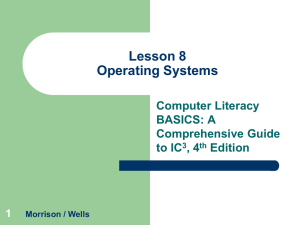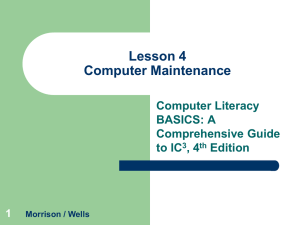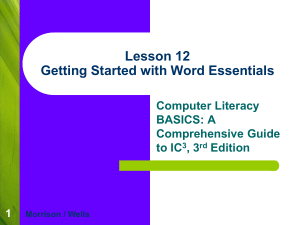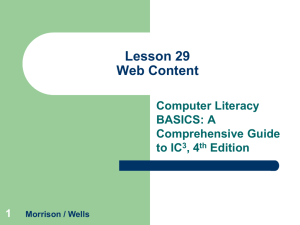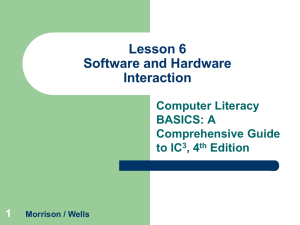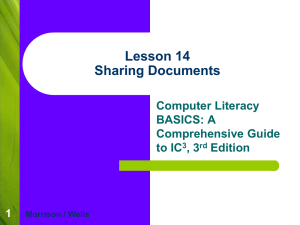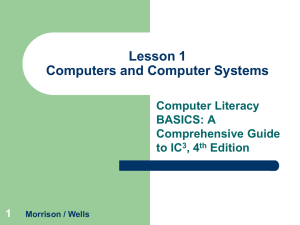Lesson 1 Computers and Computer Systems
advertisement
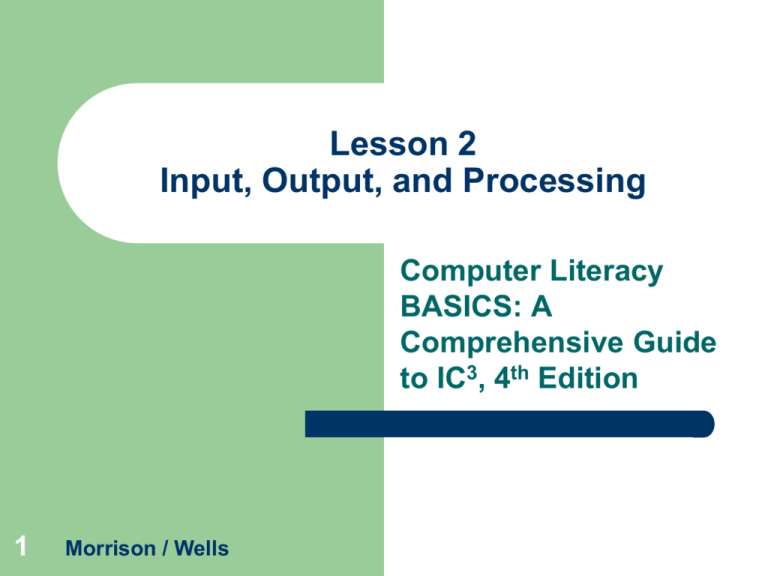
Lesson 2 Input, Output, and Processing Computer Literacy BASICS: A Comprehensive Guide to IC3, 4th Edition 1 Morrison / Wells Lesson 2 Skip to Slide 3 2 Morrison / Wells CLB: A Comp Guide to IC3 4E Input and Output Devices Input Device: Enables someone to enter data and commands into a computer. – Lesson 2 3 Keyboard, mouse, scanner, etc. Output Device: Enables the computer to give you the results of the processed data. – Monitor, projector, printer, etc. Morrison / Wells CLB: A Comp Guide to IC3 4E Standard Input Devices Lesson 2 4 Modem: - A modem is a device that allows one computer to talk to another. - Considered an Input and Output device due to its functions. Keyboards: - The keyboard is the most commonly used input device for entering text and numbers into a computer. Morrison / Wells CLB: A Comp Guide to IC3 4E Standard Input Devices (continued) Keyboards (continued): – – Lesson 2 – – – – – 5 Ergonomic Cordless/wireless Specialized Security Foldable/flexible Laser/Virtual NIK (Nearly Indestructible Keyboard) Morrison / Wells CLB: A Comp Guide to IC3 4E Standard Input Devices (continued) Keyboards (continued): - Lesson 2 - 6 - Ergonomic: more natural/comfortable hand, wrist, and arm positions. Cordless/Wireless: battery-powered that transmits data using wireless technology. Specialized: specialized keys that represent items (Ex. Fast Food keyboards) Morrison / Wells CLB: A Comp Guide to IC3 4E Standard Input Devices (continued) Keyboards (continued): Lesson 2 - 7 - - Security: provides security features such as biometric finger-print reader, magnetic stripe, and smart card readers. Foldable/Flexible: easily transported, soft, and water resistant. Used with mobile devices. Laser virtual: a laser beam generates a full-size keyboard. Used with computers, phones, and tablets. Morrison / Wells CLB: A Comp Guide to IC3 4E Standard Input Devices (continued) Keyboards (continued): NIK (Nearly Indestructible Keyboard): flexible and can be washed with soap or with spray cleaner. Lesson 2 - 8 Ergonomic Keyboard Morrison / Wells CLB: A Comp Guide to IC3 4E Standard Input Devices (continued) Lesson 2 Pointing Devices: o A pointing device is an input device you use to position the pointer on the screen. o The most common pointing device for personal computers is the mouse. – – – – 9 Mechanical Optomechanical Optical Wireless Morrison / Wells – – – Trackball mouse Radio frequency Foldable mouse CLB: A Comp Guide to IC3 4E Lesson 2 Skip to slide 11 10 Morrison / Wells CLB: A Comp Guide to IC3 4E Standard Input Devices (continued) Lesson 2 11 Pointing Devices (continued): - The trackball works like a mouse turned upside down; the ball is on top of the device. - A common feature on laptop computers is the touchpad, with a specialized surface that can convert the motion and position of your fingers to a relative position on screen. Morrison / Wells CLB: A Comp Guide to IC3 4E Standard Input Devices (continued) Lesson 2 12 Pointing Devices (continued): -Commonly known items regarding a mouse: The left button is used for most operations. Most mice have 3 buttons. The right button is used to display shortcut menu options. Morrison / Wells CLB: A Comp Guide to IC3 4E Standard Input Devices (continued) Pointing Devices (continued): -Commonly known items regarding a mouse: Sensors determine the direction and distance on a mechanical mouse. Lasers detect an optical mouse’s movement. A wireless mouse uses infrared waves to communicate with the computer. A mouse can be used to select text or portions of text by dragging the mouse pointer over the text. Lesson 2 13 Morrison / Wells CLB: A Comp Guide to IC3 4E Standard Input Devices (continued) Pointing Devices (continued): - Some notebook computers contain a pointing stick, a pressure-sensitive device that looks like a pencil eraser and is located on the keyboard, generally between the G, H, and B keys. - Audio input is sound entered into a computer. Lesson 2 14 Morrison / Wells CLB: A Comp Guide to IC3 4E ***QUICK RECAP*** What is an input device? Lesson 2 A device that enables someone to enter data and commands into a computer. This type of keyboard can be washed with soap or spray cleaner? NIK (Nearly Indestructible Keyboard) 15 Morrison / Wells CLB: A Comp Guide to IC3 4E Standard Output Devices Monitors: - Desktop computers typically use a monitor as their display device, including CRT, LCD, and gas plasma. Lesson 2 16 Morrison / Wells CLB: A Comp Guide to IC3 4E Standard Output Devices Lesson 2 17 Monitors: - CRT (Cathode Ray Tube): older type of monitor that is similar to older types of TVs. Obsolete now due to flat-panel monitors. - LCD (Liquid Crystal Display): produces an image by manipulating light within a layer of liquid crystal cells. - Gas Plasma: consists of tiny amount of gas that is activated by electrical charge. Morrison / Wells CLB: A Comp Guide to IC3 4E Standard Output Devices (continued) Printers: Printers produce a paper copy, or hard copy, of processing results. - Features of printers: Speed, Print Quality, and Price - A laser printer produces high-quality output and images similar to copy machines. - An inkjet printer provides good-quality color printing for less expense. Sprays ink onto paper. - A Dot-Matrix printer strikes a ribbon with pins to transfer ink onto paper and are seldom used today. Lesson 2 - 18 Morrison / Wells CLB: A Comp Guide to IC3 4E Standard Output Devices (continued) Printer Classifications – Impact: actually strikes the paper to form letters and images. (Ex. Dot matrix – mostly obsolete) – Nonimpact: form characters without striking the paper. (Ex. Inkjet and laser printers) • Speakers - Generate sound from speaking or music. - Headsets or headphones for privacy. Lesson 2 19 Morrison / Wells CLB: A Comp Guide to IC3 4E Lesson 2 ***Quick Recap*** This type of monitor produces an image by manipulating light within a layer of liquid crystal cells. LCD This type of printer squirts ink as it passes over a media. Inkjet printer 20 Morrison / Wells CLB: A Comp Guide to IC3 4E Specialized Input Devices - Lesson 2 - 21 Digital Cameras: The pictures you take are stored digitally and then transferred to the computer’s memory. Uses a variety of storage media: flash memory cards, USB keys, memory sticks, mini-discs and other solid-state storage devices. Morrison / Wells CLB: A Comp Guide to IC3 4E Lesson 2 Specialized Input Devices 22 Digital Cameras (continued): - Video input is a set of full-motion images captured with a video camera. - Storage media for video input devices are hard drive, CD, DVD. Webcams are video-capturing cameras connected to computers. - Can also display images through the World Wide Web. - Morrison / Wells CLB: A Comp Guide to IC3 4E Specialized Input Devices (continued) Game Controllers: - You use joysticks and wheels most often for games. Lesson 2 23 Morrison / Wells CLB: A Comp Guide to IC3 4E Specialized Input Devices Scanners/Bar Code Readers: - Scanners are devices that can change images into codes for input to the computer. Lesson 2 – 24 – – Image scanners: convert images into electric form that you can store in your computer’s memory. Bar code scanners: reads bar lines that are printed on objects. Magnetic scanners: read encoded information on credit cards. Morrison / Wells CLB: A Comp Guide to IC3 4E Specialized Input Devices Scanners/Bar Code Readers (continued): – Lesson 2 – 25 Wireless scanners: use Bluetooth technology to scan barcode data. Optical character recognition (OCR) and optical mark recognition (OMR) scanners: use a light source to read characters, marks and codes; then converted back into digital format. Morrison / Wells CLB: A Comp Guide to IC3 4E Specialized Input Devices (continued) Touch Display Screen: - A special screen that reacts to direct touches within the display area, usually from a person’s finger or hand. Lesson 2 26 Morrison / Wells CLB: A Comp Guide to IC3 4E Specialized Input Devices (continued) Lesson 2 27 Stylus: - A stylus and digital pen are pen-like writing instruments used to enter information by writing on a screen on a mobile device or using the pen as a pointer. Morrison / Wells CLB: A Comp Guide to IC3 4E Specialized Input Devices (continued) Environmental Probes and Sensors: - Workers can view information such as the temperature and humidity of a remote environment, smoke detector readings, and pollution control readings. Remote Controls: - Used to manage devices such as televisions, lights, and fans. Lesson 2 28 Morrison / Wells CLB: A Comp Guide to IC3 4E Lesson 2 Specialized Input Devices (continued) 29 Security Devices: - Biometrics is an authentication technique using automated methods of recognizing a person based on a physiological or behavioral characteristic. - Used for security purposes. - Commonly based on finger prints, face, handwriting or voice. - Less common uses: retina/iris scan, or hand geometry. Morrison / Wells CLB: A Comp Guide to IC3 4E Lesson 2 Skip to slide 31 30 Morrison / Wells CLB: A Comp Guide to IC3 4E Specialized Input Devices (continued) Virtual Devices: - Use the synchronized positioning of light-emitting and sensing devices to detect user input. Lesson 2 31 Morrison / Wells CLB: A Comp Guide to IC3 4E Specialized Input Devices (continued) Touch-Sensitive Pads: - On a portable device, enables you to scroll through a list, adjust the volume, play music, view videos or pictures, and customize settings. Lesson 2 32 Morrison / Wells CLB: A Comp Guide to IC3 4E Lesson 2 Specialized Input Devices (continued) 33 Input Devices for the Physically Challenged: - A variety of special input devices are available for the physically challenged. - Keyboards that can be operated by a single hand or feet. - Joystick computer mouse that uses lips, chin, or tongue. - Human Computer Interface that uses eye control to move a pointer and make selections. Morrison / Wells CLB: A Comp Guide to IC3 4E Specialized Input Devices (continued) Lesson 2 Skip to slide 35. 34 Morrison / Wells CLB: A Comp Guide to IC3 4E ***QUICK RECAP*** This type of scanner reads bar lines that are printed on objects. Lesson 2 Barcode scanners This technique uses methods for recognizing a person based on finger prints and voice? biometrics 35 Morrison / Wells CLB: A Comp Guide to IC3 4E Specialized Output Devices Specialized Output Devices: – – Lesson 2 – 36 – Projectors Fax machines and fax modems Multifunction printer Control devices/robots Specialized Printers: Thermal – Mobile – Label and postage – Plotters/large-format Morrison / Wells – CLB: A Comp Guide to IC3 4E Specialized Output Devices (continued) Output Devices for the Physically Challenged: Lesson 2 – 37 – – Screen magnifiers Screen readers Voice synthesizers Morrison / Wells CLB: A Comp Guide to IC3 4E Connecting Input and Output Devices to a Computer Ports and Connectors: - A port, also called a jack, is an interface to which a peripheral device attaches to or communicates with the system unit or other peripheral devices. - A Universal Serial Bus (USB) port can connect up to 127 peripheral devices with a single connector and transfer data at rates of up to 200 million bits per second (Mbps). - Plug and play refers to the ability of a computer system to configure expansion boards and other devices automatically. Lesson 2 38 Morrison / Wells CLB: A Comp Guide to IC3 4E Connecting Input and Output Devices to a Computer (continued) Ports and Connectors (continued): - FireWire: supports data transfers up to 400 Mbps and can connect up to 63 external devices. - Special-purpose ports: Lesson 2 – 39 – – SCSI: standard interface for connecting peripherals such as hard drives and printers. IrDA: a wireless standard that allows data to be transferred between devices using infrared light instead of cables. Bluetooth: uses radio waves between voice and mobile devices. Morrison / Wells CLB: A Comp Guide to IC3 4E Connecting Input and Output Devices to a Computer (continued) Ports and Connectors (continued): - Expansion slots are openings on the motherboard where an expansion board can be inserted. Expansion boards are also called adapter cards, expansion cards, add-ins, etc. Lesson 2 - 40 Morrison / Wells CLB: A Comp Guide to IC3 4E Connecting Input and Output Devices to a Computer (continued) Hardware Installation: - For most hardware devices to work, they need a set of instructions that communicates with the computer’s operating system. This set of instructions is called a driver. - If the device does not come with a driver, you must download and install the driver manually. Lesson 2 41 Morrison / Wells CLB: A Comp Guide to IC3 4E ***QUICK RECAP*** Name (1) type of output device for the physically challenged. Lesson 2 Screen magnifier, screen reader, voice synthesizer This type of port can connect up to 127 peripheral devices with a single connector. USB (Universal Serial Bus) 42 Morrison / Wells CLB: A Comp Guide to IC3 4E Considering Computer Performance Factors A variety of factors can affect a computer’s performance. Lesson 2 – – – – 43 Microprocessor: The higher the generation, the faster and better the processing speed. Random Access Memory (RAM): Helps to speed up the processing cycle. Hard disk: The bigger and faster the hard drive, the faster it can process data. Video: Need adequate video memory. Morrison / Wells CLB: A Comp Guide to IC3 4E Computer Viruses Lesson 2 44 Can cause tremendous damage to your computer files. A program that spreads from one computer to another and interferes with the computers’ operation. Can be stored on a computer for weeks or months and may not cause damage. Spread by email attachments or downloaded files. Not all viruses cause damage; could be a prank. Install anti-virus software to protect yourself. Morrison / Wells CLB: A Comp Guide to IC3 4E
